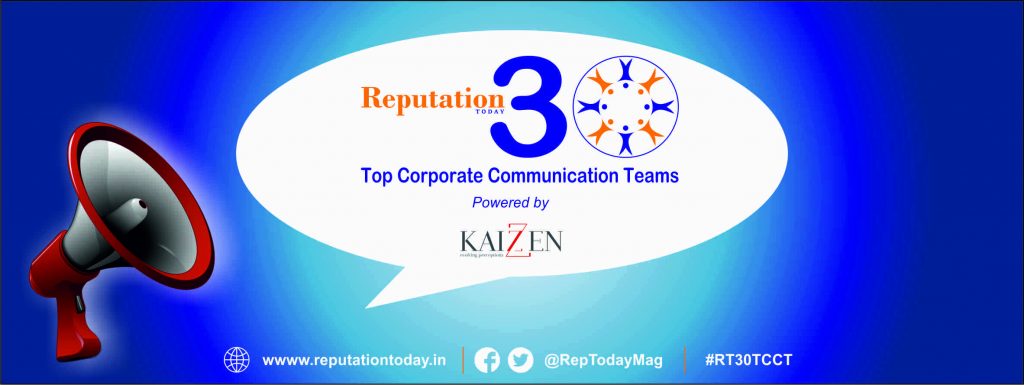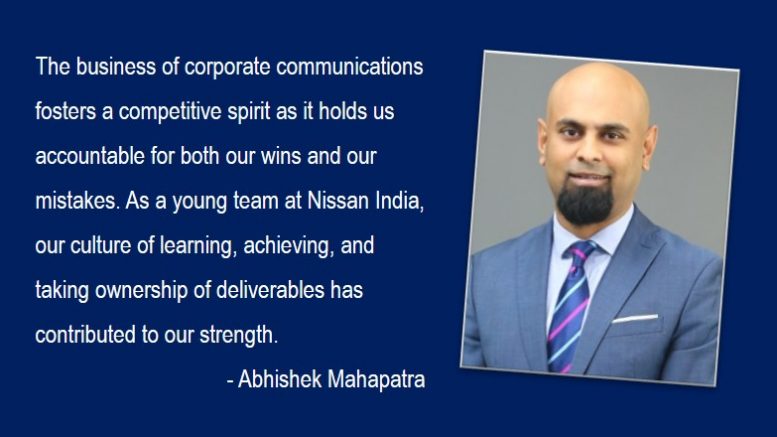The corporate communications community is a close-knit one, and a substantial amount of our talent pool comes from the consultancy world. The business is also relatively new, emerging out of its early days, a time of aggressive learning and development for its future leaders. It has evolved from a time when people did not know the difference between core functions like PA and PR, to today, when its credibility makes it attractive to new professionals. At Nissan India, a few pragmatic ways have ensured that our recency, both as a communications team and as an industry, does not deter our contribution to business.
- Strong fundamentals – While all communication today demands the ability to innovate and be creative, these qualities are meaningless without a strong foundation. In today’s competitive auto industry marketplace, our reach should always exceed our grasp, but the ‘simple stuff’ that we never take for granted is the bedrock of our team’s success. Getting our basics right with even more rigour over time, impart new efficiencies, freeing resources to think new and do the undone.
- Hiring by insight – Our success banks on our people, and certain qualities that they have. We at Nissan look for people with a strong sense of character; values like honesty, hard work, and integrity which cannot be taught. Simultaneously, while skills are definitely important, strong communications fundamentals ensure that knowledge and operational skills are teachable. These are a few things we look for when bringing someone on board the Nissan India communications team.
- Own it and live it – The business of corporate communications fosters a competitive spirit as it holds us accountable for both our wins and our mistakes. We are a young team, and our culture of learning, achieving, and taking ownership of deliverables has contributed to our strength. Team members take onus, deliver, and complement each other’s efforts with a dash of competitiveness.
- Skill building begins with honesty – One of the most abused business terms, ‘skill-building’ only truly works with an element of introspection. A leader who fosters a culture where his employees can fearlessly own up to both their competencies and skill-deficits, will achieve far better learning outcomes than enrolling them in generic skilling exercises. This approach also makes it easier to make learning a collective responsibility, as the team champions in a specific competency (e.g. product communications) can augment and expose those who need these skills the most.Exposure and relevance are the two ingredients of building a winning team; if Tiger Woods were only playing in his mom’s backyard, he would not have become Tiger Woods. There is no better training than on-the-job, which is why our people are given in many opportunities to learn and grow.
- A sense of internal consonance and pride – Plans on paper don’t often materialise the same way in real life, yet what has kept us going is our ability to take pride in what we all do. While the Reputation Today ranking has not only given recognition to our work and the team at large, we give a higher sense of importance to driving a sense of recognition from within. I firmly believe that we are as good as our last performance. Our highest benchmark is what we were yesterday, so we can improve upon it. This, in brief, ‘Kaizen’, the Japanese belief system of incremental improvements that over time add up to create transformative outcomes. Our strongest asset is a team that gives 200 percent to achieve and outperform, and in the process enjoys the journey. This spirit of go-getting has led us to climb the Reputation Today ranking so quickly.
- Understanding the industry and carving out our place The Nissan India Communications team is quite young in India’s highly saturated automotive marketplace. The fundamental challenge we are solving for is: how do you position a young brand in a country which is dominated by clutter? On the outside, the auto industry looks fancy, yet its significance as a key driver of the manufacturing sector is not lost on us. We are constantly clued into the many changing dynamics that define it.
- Enterprise-storytelling as a business asset – While celebrity endorsements and car launches are significant opportunities to drive media traction, an enterprise’s story must be told all-year round. That is where our approach to enterprise storytelling, defined by a seamless combination of content, context, and topicality, comes into play.
Enterprise storytelling opens the canvas and allows us to explain not only how and why 6,000 team members at our manufacturing facility come together to build our cars, but also position the company and its offerings as exciting and relevant to customers. Identifying new socio-cultural positioning opportunities for our products, people, and processes has created some brilliant storytelling.
A great example is our after-sales service ‘foam wash’, a highly water-efficient technique that became globally renowned when we leveraged the topicality of World Earth Day. We packaged it with an impactful infographic explaining how we save 6.1 million litres of water every year. It generated massive media traction, and our after-sales service team was contacted from as far away as Eastern Europe and South Africa, by people curious about how we were achieving this water saving, and directly contributing to our business.
While business is the core of what we do, what drives us is a strong human essence that is infused in our team culture, and in how we tell our story. And, at the end of the day, our truest point of reference is asking: “Are we enjoying ourselves”?

This article is part of series written by team leaders or professionals from the Reputation Today 30 Top Corporate Communication Teams – 2018 powered by Kaizzen Communications.







Be the first to comment on "Competitive, yet Complementing: Nissan India’s New Communications Culture"